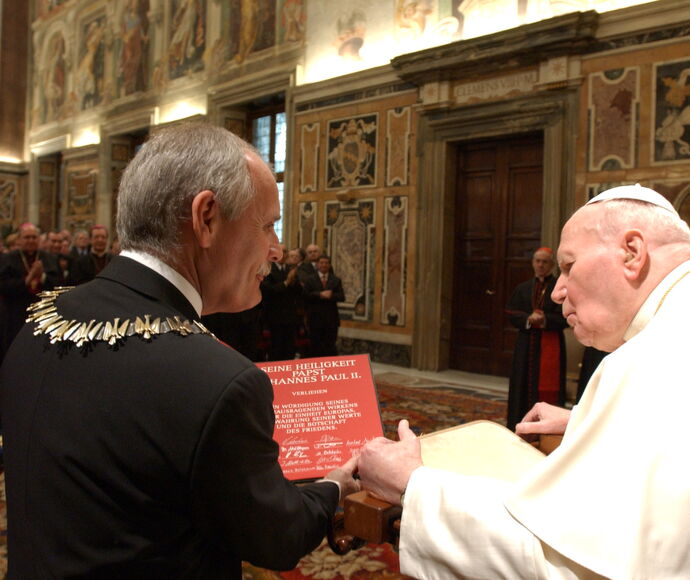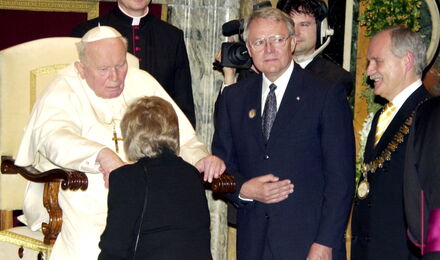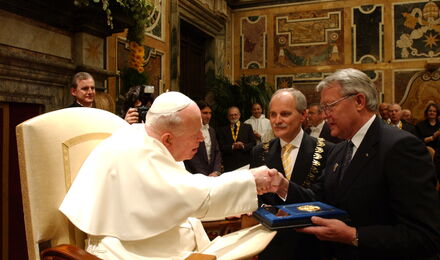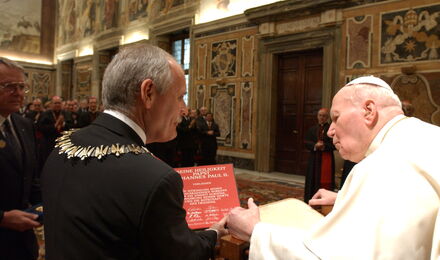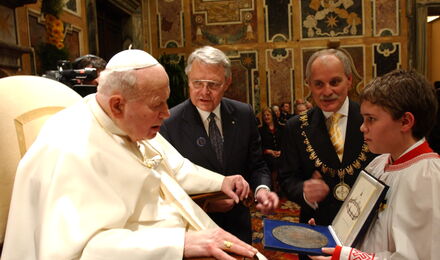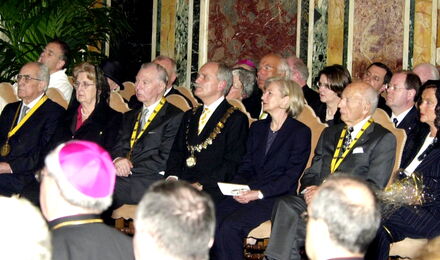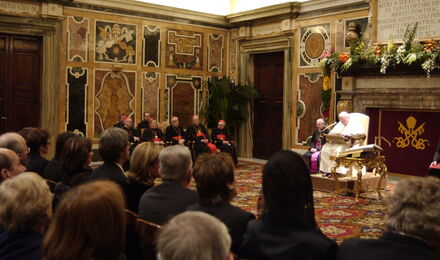Award of the Extraordinary Charlemagne Prize to His Holiness Pope John Paul II:
(1) Europe has become a community of values through its shared history, shared experiences in many areas and, ultimately, a shared culture of life. The spirit of antiquity, the influence of various religious beliefs, but above all the convictions and power of Christianity have laid a foundation on which freedom, respect and tolerance, equality and solidarity could flourish.
(2) The draft of a political, economic and also social European Union has only become possible through these achievements and the common identity that has grown over centuries.
(3) Europe today recognises the challenge of offering its best intellectual traditions and values to the world and making a constructive contribution to the new world order in a creative way.
(4) The Board of Directors of the Society for the Conferring of the International Charlemagne Prize of Aachen is honoured to be able to single out His Holiness Pope John Paul II for special distinction by awarding him the extraordinary Charlemagne Prize.
(5) Pope John Paul II is a prominent and exemplary role model for people all over the world when it comes to European values, particularly respect for the dignity and freedom of the individual, equality, solidarity and humanity. He represents the inviolability of human rights and peace like no other.
(6) His encounters and conversations demonstrate that peoples, religions and cultures can live together in harmony without any person or state having to renounce the truth as they recognise it in freedom.
His respect for life teaches us to respect creation and in particular its crowning glory, the human being.
(7) Pope John Paul II's way of life is a testament to the fact that the values and traditions fought for in Europe can play a decisive role in the development of a new political world order and that Europe should exert influence in this regard. The Holy Father's example calls on us Europeans to represent these values, especially the message of peace in the world.
(8) The person and life's work of Pope John Paul II are a model for the process of European integration. The foundation of values that he embodies enables the people in the European Community to see themselves as Europeans on this common basis. In his ‘life programme for the whole of Europe’, he draws attention to the fact that the European Union can only be an effective entity if it promotes not only economic and political values, but above all spiritual and cultural values.
(9) For him, culture is the common heritage of ethical values and religious experiences. Culture also means a richness of life, an exchange of spiritual traditions and achievements, as well as mutual creative fertilisation. He recommends that states and governments, each in their own way, through national and regional contributions, should give concrete expression to the unique European culture – while at the same time maintaining respect for diversity. In a speech given in Santiago de Compostela in 1982, the Holy Father called on Europe: ‘Find yourself again. Be yourself. Rediscover your origins. Revive your roots... You can continue to be a beacon of culture and a driving force for progress in the world.’
(10) Pope John Paul II promoted interreligious dialogue and thereby improved the coexistence of people in a changing Europe. He taught us that a multicultural society cannot survive without common constants, without points of reference and values. If we denied this, we would negate the identity of Europe and give our cultures a profanity that would no longer be creative. His Holiness has repeatedly and convincingly advocated overcoming anti-Semitism.
(11) Through his attitude, including his politically understood appearance, the Pope has decisively promoted the fall of the Iron Curtain and thus stimulated the expansion and integration process for the whole of Europe. From the time of his election, his work was of great importance for the people of Central and Eastern Europe. Long before the fall of the ideological border, he repeatedly called on them to shape their own future democratically; he reminded them of freedom and humanity, thus taking a stand against violence and oppression. He gave people courage and confidence for the process of liberation, as well as the feeling of belonging to Europe. At the same time, he convinced the other Europeans that there were also Europeans living behind the Iron Curtain, that European culture was being cultivated and that there was a European consciousness.
(12) The Holy See's involvement in the Conference on Security and Cooperation in Europe provided political support for this objective and ultimately helped to end the Cold War.
(13) In a landmark speech in Brussels in 1985, the Pope called for peace to be built on the foundations of lasting understanding and for the conditions for joint European talks to be restored.
(14) His Holiness Pope John Paul II played a major role in ending the communist systems of rule in Europe and in the bloodless integration of the peoples concerned.
(15) Through his travels and his unceasing efforts to bring together people of different origins, opinions and also different beliefs, to promote dialogue and to deepen the search for common ground, Pope John Paul II strengthened the sense among citizens that Europe should not be afraid of opening up, but that openness is an expression of its strength and that there is no alternative to common ground and understanding among peoples.
(16) In the current debate on the draft constitution presented by the European Convention, the Pope's position must be treated with respect. John Paul II demands that the constitution must also recognise the contribution of Europe's Christian heritage. He calls on the political decision-makers to use this historical experience to ultimately restore Europe's identity and to include a reference to God in the text of the constitution.
Pope John Paul II has called on the European Union to engage in a structured dialogue with the religious communities, a dialogue characterised by respect for their freedom, their rights and their specific identity (cf. Post-Synodal Apostolic Exhortation Ecclesia in Europa, 114).
(17) The Pope repeatedly urges Europe to implement the Charter of Fundamental Rights of the European Union and thus give the economic area of Europe the necessary ‘spiritual anchoring’.
(18) Pope John Paul II is an extraordinarily invigorating and constructive spiritual and ecclesiastical centre in the European integration process.
(19) The Board of Directors of the Society for the Conferring of the International Charlemagne Prize of Aachen honours his work as an outstanding and exemplary contribution to the unity of Europe and to Europe's role in the world.




